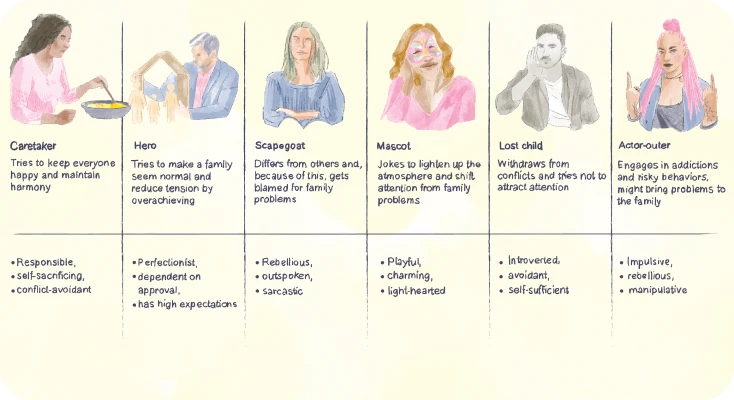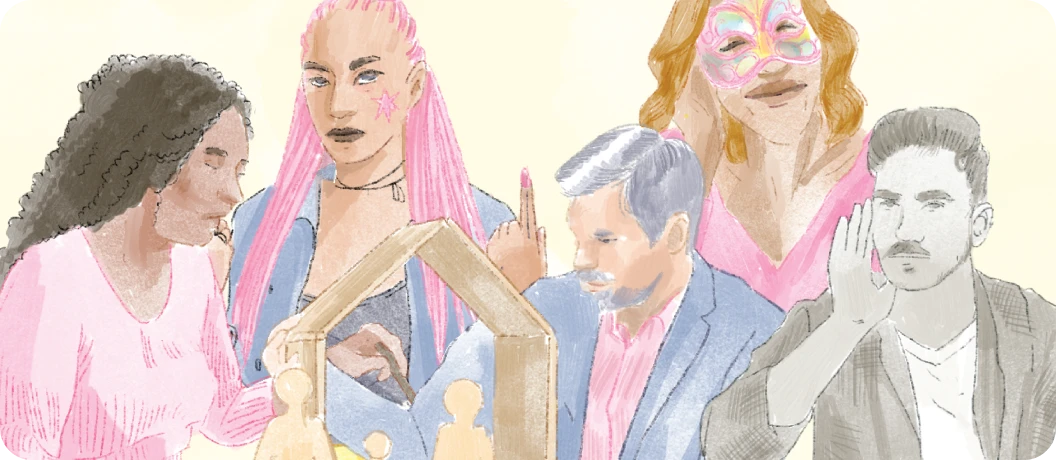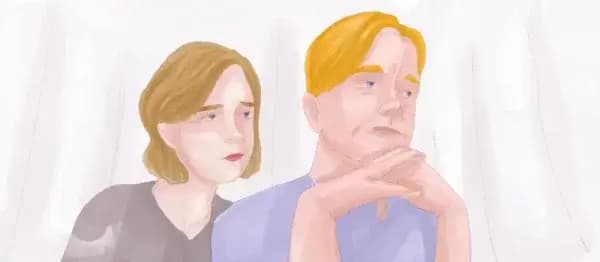Podcast name
Dysfunctional Family Roles
Why can’t we live like a normal family?! A loving and caring family where everyone supports each other. You slam the door and rush to your car, irritated. Every family holiday finishes in the same way.
It’s like a constant drama behind closed doors. Actually, it has been like a constant drama in which everyone has their parts for as long as you can remember! And you still, even in adulthood, feel the echo of those dysfunctional family roles (despite your desire to rebuke the part you played.)
Want to find out which role you’ve been cast in and how it impacts your life today? Let’s dive into the toxic family roles and uncover the part you may have been playing all along, and what you can do to rewrite the script.
The most common family roles in psychology
- Caretaker (aka “enabler,” “peacemaker,” or “mediator”)
- Golden child / hero
- Scapegoat child / black sheep of the family
- Mascot
- Lost child
- Actor-outer (aka “addict”)
Dysfunctional family roles quiz
Before we delve deeper into the most common roles in a dysfunctional family, let’s identify which one is closer to you. Please choose one or a few answers to each question. Then, calculate how many times you opted for each letter.
1. When family tension is high, what’s your first instinct?
A. Make sure everyone is calm and OK.
B. Do my best to show people around us that everything is under control.
C. Call out the real issues, even if it stirs more tension.
D. Crack a joke to lighten the mood.
E. Stay quiet and try to disappear into the background.
F. Throw a party or do something reckless just to shift focus.
2. At family gatherings, you usually…
A. Quietly check in with people, making sure everything flows smoothly without much fuss.
B. Mention what I’ve been working on and talk about what’s new happening around.
C. Hang back, feeling like I just don’t quite fit the picture.
D. Become the source of laughter. People love me because I’m funny.
E. Think, “Just don’t bother me,” find a comfortable corner, and stay on my own.
F. Feel like I might burst and make a snarky comment. I hate all those gatherings!
3. When you feel overlooked, how do you respond?
A. I often do little kind things for others, hoping they’ll notice and appreciate me.
B. “Have you heard that I got promoted? Let me tell you about it!”
C. They will notice me once something goes wrong. So, it’s better to keep my head down.
D. “Do you want a joke?” “Do you know that funny story?” — humor is my main strategy.
E. Who thinks that I want to get noticed? The only thing I want is to withdraw into the background.
F. When it gets impossible to handle, I might do something they don’t expect. I know they’ll get angry.
4. If your family were a team, what would your role be?
A. The coach who keeps everyone working together.
B. The star player who always leads the charge.
C. The outspoken one who questions the playbook.
D. The cheerleader who keeps everyone in the mood.
E. The quiet benchwarmer.
F. The player who often receives red cards.
5. How do you navigate emotions in your family?
A. I try to ensure that others are OK no matter what happens.
B. I stash my feelings away, letting nothing distract me from my goals.
C. Why should I bottle them up? I let my emotions flow freely, even if it stirs the pot a bit.
D. Humor is the best choice. No matter what happens, this always helps me cope.
E. I keep my emotions to myself and stay out of the way.
F. When emotions overwhelm me, I unleash my frustration and act out in ways that reflect the turmoil inside.
Family roles in dysfunctional families. Results of the quiz
Ready? Great! Now, let’s identify the results.
Remember that a person can play a few family roles in dysfunctional families. Thus, if you see scores in multiple areas, it shows the different ways you handle family dynamics. And it’s completely OK.
- Most A — caretaker
- Most B — golden child
- Most C — scapegoat
- Most D — mascot
- Most E — lost child
- Most F — actor-outer
It’s important to note that all families have some element of dysfunction. However, it doesn’t necessarily mean that every family is toxic or damaging. Some dysfunction is natural, but it becomes problematic when unhealthy patterns dominate.
Whatever role you take on, it’s usually not a problem unless it becomes rigid, unbalanced, enmeshed, or limits your emotional well-being. But if you suspect that the issue hides here, keep reading.
Dysfunctional Family Roles
Various sources identify different numbers of roles in families. Some therapists state that there are 4 types of dysfunctional family roles, particularly:
- The hero (golden child)
- The scapegoat
- The lost child
- The clown (mascot)
- The caretaker (mediator)
In this article, we focus on 6 main family roles and their differences. While some sources identify up to 8 various roles, we’ll provide a more united version that’s the most all-embracing and, at the same time, easy to understand.

1. Caretaker role in the family
It could be an adult or a parentified child who tries to keep everyone happy and maintain harmony within the family. Typically, a caretaker (also known as “enabler,” “peacemaker,” or “mediator”) feels compelled to neglect their emotional and physical needs to care for others.
Their family function is to make the family seem normal and hold everything together — no matter how chaotic things really are behind the scenes.
Main personality traits:
- Responsible
- Self-sacrificing
- Conflict-avoidant
- Overly nurturing
- Resilient
What’s hidden behind the surface:
- People-pleasing and fawn trauma response
- Emotional burnout
- Guilt complex
If a child takes this role, this might turn into parentification trauma in the future. These kids often become little adults, shouldering the responsibility of keeping the family regulated.
Often living with eldest daughter syndrome, they take care of younger siblings, do household chores, and may even manage the family budget and maintain emotional regulation of the household.
Is “responsibility” your middle name, and is “fun” a strange word without meaning for you? Then, among dysfunctional family roles, you might have slipped into the shoes of a caretaker.
2. The hero child / golden child
While some sources describe these as separate roles in the family, we’ll unite them here since their behaviors and emotional dynamics are similar.
The family hero definition refers to the family member who takes on the role of overachiever and perfectionist to compensate for family problems. “Our hope,” “our future,” “the best and the first one” — this is how relatives may approach the hero.
The golden child also receives special favors. However, this is more common in narcissistic families, where the focus is on meeting the parents’ unrealistic standards.
Golden children often feel the weight of being favored and, because of this, opt for overachieving. Their self-worth becomes enmeshed in the parents’ unrealistic standards, which can have long-lasting negative impacts.
What’s the difference between these terms?
The hero is the one who steps up to keep the family together. They work hard, do great things, and often feel the pressure to fix problems and prove that the family is “all right.”
In contrast, the golden child was initially the favorite. They usually get special treatment from parents and are seen as ideal kids. Feeling pressure from this constant spotlight, golden children start doing their best, as they simply “can’t” do wrong.
No matter which child roles in dysfunctional families (from these ones) you fit better, here are the main personality traits.
- Perfectionist
- Overachieving
- Responsible
- High expectations
- Dependent on approval
What’s hidden behind the surface:
- People-pleasing
- Fear of failure
- Struggles with self-identity and self-worth
3. Scapegoat family role / black sheep of the family
You’re not like them. No one can understand you, or maybe no one wants to understand you.
There’s a certain difference between the family roles of scapegoat and black sheep of the family.
The scapegoat is the one “guilty” of literally everything in the family. Has the dog eaten the homework? Blame the scapegoat. The car won’t start? It must be their fault for not checking the oil.
They become the family’s convenient outlet for blame, carrying the weight of every mishap and disappointment.
A black sheep is someone different from other family members. You might be an introvert in a family of extroverts. You may crave traveling the world, while others value office jobs. As a result, black sheep might become scapegoats. It is easier to blame someone who navigates life differently, isn’t it?
Feeling like they’re ill at ease, scapegoats and black sheep serve as the most honest ones in family functions. They often speak the truths others are too afraid to voice, cutting through the pretense and calling out the dysfunction that everyone else pretends doesn’t exist.
It can be a common theme for black sheep to present to therapy first as the family’s identified patient with the mentality of “fix them, don’t fix me.”
Main personality traits:
- Emotional intensity
- Rebellious
- Outspoken
- Sarcasm or humor
- Cynical
What’s hidden behind the surface:
- Self-criticism
- Isolation
- Feeling misunderstood
4. Mascot child
In family dynamics roles, mascots or clowns are the ones who try to lighten up the atmosphere.
Think about Bart Simpson from The Simpsons. While the family experiences many problems, Bart uses humor and pranks to ease the tension. He distracts from deeper issues, like Homer’s anger or Marge’s stress, by being the troublemaker and comic relief.
This is how mascots typically behave. But while they seem carefree, there’s often something less pleasant hidden.
In family roles psychology, the mascot uses humor like a suit of armor — they protect themselves (and sometimes the whole family) from dealing with the heavy stuff. Yet behind the laughter, mascots can feel overwhelmed and hide their emotional struggles.
Main personality traits:
- Playful
- Charming
- Non-serious
- Light-hearted
- Seeking attention
What’s hidden behind the surface:
- Insecurity
- Fear of being unloved
- Masking real emotions
- Unregulating discomfort with emotions such as anxiety, disappointment, anger, and sadness.
5. Lost child family role
“Don’t talk to me, bother, or notice me.”
Lost children are the ones who withdraw from any conflicts. They hang a sign, “Do not disturb,” on the door to their soul and just fade into the background.
This way, they try to avoid any conflict, as being noticed means being guilty of something. While staying quiet, lost children don’t cause any trouble — pretty much like they don’t exist.
Main personality traits:
- Introverted
- Avoidant
- Self-sufficient
- Quiet observer
- Daydreamer
What’s hidden behind the surface:
- Emotionally distant
- Fearful of conflict
- Feeling unimportant
- Challenges with interpersonal and intrapersonal emotional awareness.
As a result of these family functions, the youngest kids can develop lost child syndrome. They might keep feeling unseen and lonely and have low self-esteem.
Moreover, it might be challenging for a lost child to build intimate relationships and open up to others, constantly pushing people away either out of discomfort with vulnerability, or difficulties with emotional connectivity.
6. Actor-outer
Interestingly, the concept of a dysfunctional family originally comes from studies about family roles in addiction. Mental health experts found that family members take on certain roles to try to keep things stable.
Over time, these roles became useful for understanding any dysfunctional family, not just those dealing with addiction.
Because of this, some therapists don’t always see the actor-outer (or addict) as a separate role anymore. But we still think it’s important to include it in the family roles list.
So, who’s the actor-outer? This is the person who is often the “source” of family conflicts. They often have substance use problems, engage in risky behaviors, or act out in ways that disrupt family balance.
But do dysfunctional families really strive for this balance? Usually, real problems go much deeper than those of a single person.
Main personality traits:
- Impulsive
- Rebellious
- Manipulative
- Self-destructive tendencies
- Aggressive
What’s hidden behind the surface:
- Guilt
- Emotional volatility
- Loneliness
Can people change their family roles inside the family? Answer from therapist
Breeze asked Katherine Scott, M.Ed/Ed.S, LMFT, if we could change our family roles inside the family.
“The simple answer is yes.” – she says, “Thematically, family roles are most heavily influenced by generational legacy and trauma. This makes role-shifting within a family sticky and challenging, as changing out of an ‘assigned’ role usually disrupts the family’s equilibrium, as healthy or unhealthy as it may be.”
Dysfunctional family roles chart
Well, now you know a lot about the concept of family roles. Now, let’s organize it in a simpler way. Save a dysfunctional family roles chart to help you easily recognize patterns and navigate family dynamics.
| Role | Behavior | Traits |
| Caretaker | Tries to keep everyone happy and maintain harmony | Responsible, self-sacrificing, conflict-avoidant |
| Hero | Tries to make a family seem normal and reduce tension by overachieving | Perfectionist, dependent on approval, has high expectations |
| Scapegoat | Differs from others and, because of this, gets blamed for family problems | Rebellious, outspoken, sarcastic |
| Mascot | Jokes to lighten up the atmosphere and shift attention from family problems | Playful, charming, light-hearted |
| Lost child | Withdraws from conflicts and tries not to attract attention | Introverted, avoidant, self-sufficient |
| Actor-outer | Engages in addictions and risky behaviors, might bring problems to the family | Impulsive, rebellious, manipulative |
How do family dysfunctions affect adults?
Like an echo from the past, dysfunctional family roles in adulthood might bring some emotional baggage. People may carry it through life without even noticing how heavy these unresolved traumas from the past are.
What might adult children of narcissistic parents and those living in dysfunctional families experience? Here are the most common issues.
- Mental health concerns. When growing up with toxic family roles present, you might still feel unsafe in adulthood, which can cause depression, anxiety, and other mental health conditions.
- Low self-esteem. Take a look at the 6 family functions. Do you notice a pattern? All of them come from unmet emotional needs, which could have left you feeling worthless.
- Perfectionism or fear of failure. While this is especially common in the caretaker and hero-child roles, others may also feel it. People may try to live up to others’ expectations or avoid potential conflicts.
- Emotional dependency. The need to get constant validation from others may be your constant companion. As a result, you might feel incomplete without your partner’s approval.
- Trust issues. All dysfunctional family child roles have something similar — when playing them, people usually can’t lean on the closest relatives. Sometimes, this behavioral pattern may lead to isolation in adulthood.
- Emotional unavailability. In contrast to dependency, some can find it challenging to open their hearts and share emotions. Fear of intimacy might make it hard to form deep, trusting connections.
- Unhealthy coping mechanisms. Last but not least. Child roles in dysfunctional families can lead to unresolved childhood trauma. In that case, a person may try to cope with it through substance use, risky behavior, etc. (which isn’t an effective way to handle the experience).
How to heal from dysfunctional family roles?
No silver bullet can help you leave past experiences behind in a few minutes. Yet, some strategies may be helpful to support your well-being and develop healthy coping mechanisms different from those you’ve seen in childhood.
Save some of them:
- Recognize the role you had to play growing up in your family
- Set clear and healthy boundaries
- Encourage open communication with family members
- Identify and challenge negative beliefs
- Reflect on your emotions
- Set realistic expectations for yourself and others
- Focus on self-care and personal growth
If you feel that the weight of family dynamics holds you back and nothing can help, it’s essential to reach out to a licensed therapist. Together with a mental health professional, you’ll develop effective coping mechanisms and foster a healthier relationship with yourself and others.
Disclaimer
This article is for general informative and self-discovery purposes only. It should not replace expert guidance from professionals.
Any action you take in response to the information in this article, whether directly or indirectly, is solely your responsibility and is done at your own risk. Breeze content team and its mental health experts disclaim any liability, loss, or risk, personal, professional, or otherwise, which may result from the use and/or application of any content.
Always consult your doctor or other certified health practitioner with any medical questions or concerns
Breeze articles exclusively cite trusted sources, such as academic research institutions and medical associations, including research and studies from PubMed, ResearchGate, or similar databases. Examine our subject-matter editors and editorial process to see how we verify facts and maintain the accuracy, reliability, and trustworthiness of our material.
Was this article helpful?








